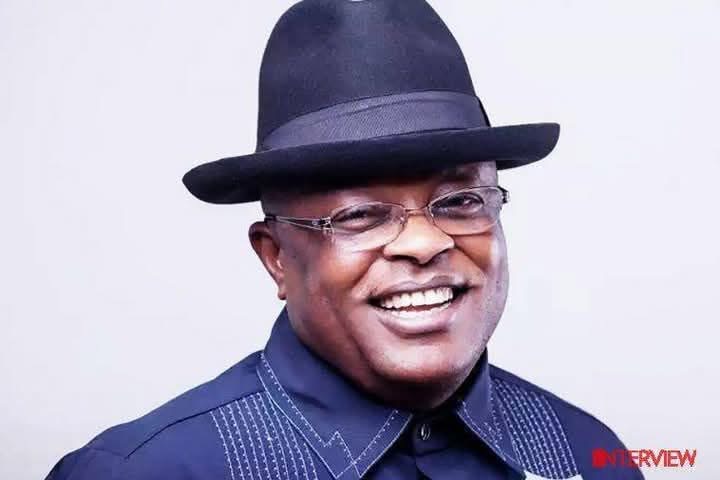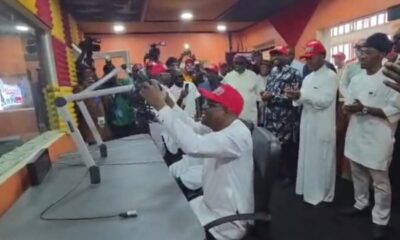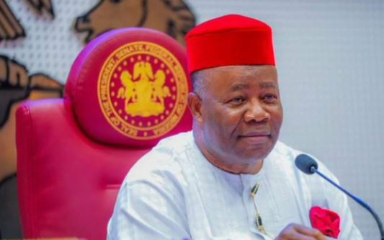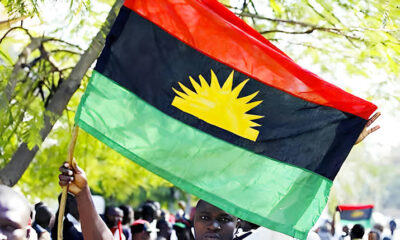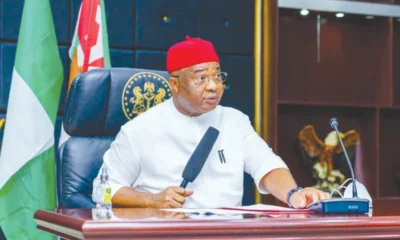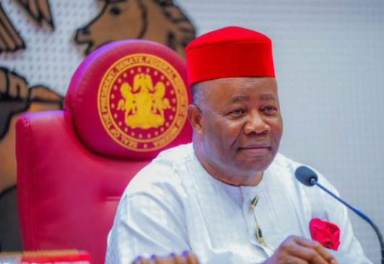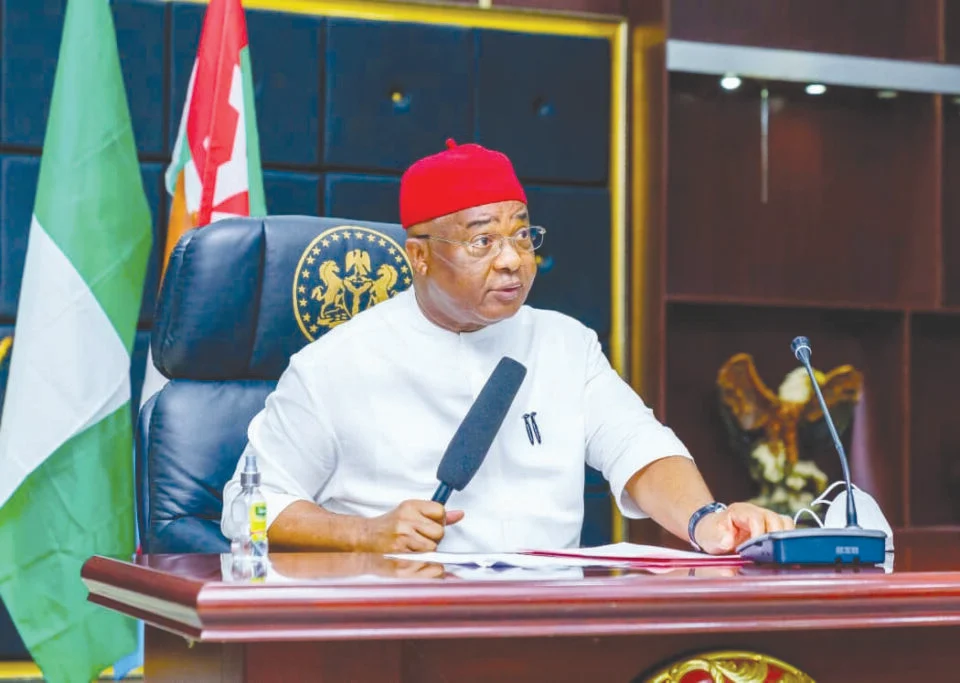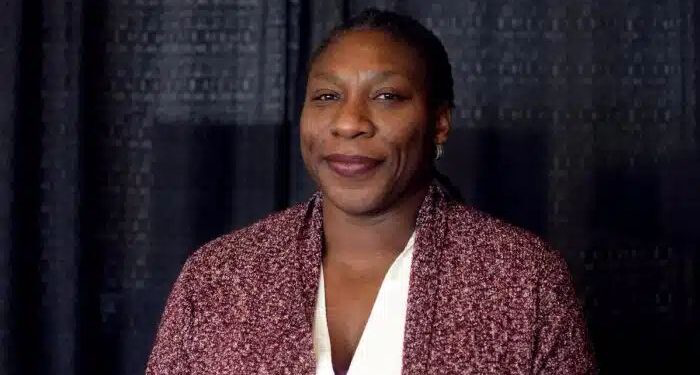The Federal Executive Council on Monday approved the rescoping of old highway contracts and new reads worth about N1.81tn, consisting of N760.4bn in naira-denominated projects with a separate $651.7m (N1.05tn) facility for the 7th Axial Road linking the Lekki Deep‑Sea Port to Sagamu‑Ore.
This also includes the Aba‑Ikot‑Ekpene Road, whose first phase was ratified at N30.23bn alongside nine other corridors spread across 12 states.
The Minister of Works, Dave Umahi, revealed this to State House Correspondents at the end of the 25th meeting of the Federal Executive Council under the Bola Tinubu administration, at the Aso Rock Villa, Abuja.
Umahi said, “FEC approved the rescoping of a project that is within Ondo State and Ekiti State and approved that the fund available be used to do 15 kilometres of the 18.438 kilometres dualised,” adding that the Akure-Ado‑Ekiti dualisation will now cost N19.407bn for the trimmed 15-kilometre stretch.
He noted that similar variations have reduced the Sokoto-Zamfara-Katsina-Kaduna corridor to 82.4 kilometres plus six bridges for the same N105bn originally budgeted.
Umahi explained, “FEC approved the rescoping of a project that is within Ondo State and Ekiti State and approved that the funds available be used to do 15 kilometres of the 18.438 kilometres dualised. And so, the FEC had earlier approved that we should be able to rescope all the inherited projects within the available funds. So we say that 15 kilometer is been rescoped for a contract sum of N19.407bn and that is rescoping/variation of dualisation of Akure-Eta-Ogburu-Ijo-Ekiti border to Ikere-Ado-Ekiti section one, and that is in Ekiti state, and spanning to Ondo State. That was approved.
“The second approval came from the rescoping and variation of the Sokoto road that goes to Zamfara, Katsina and Kaduna. It is a total of 375 kilometres dualised, and we inherited it even though it was awarded at the twilight of the last administration. It was divided into four sections.
“The first section, being done by SKCC starting from Sokoto to Zamfara, is being done on reinforced concrete. The second section is done in Zamfara axis, and is being done by Setraco, and that’s the section that was originally awarded.
“The old section was 175 kilometer, and it was awarded for N105bn and so, in line with FEC approval, we had to review the contract, but within the available funds in NNPC, which is N105bn, so we rescoped it to 82.4 kilometer plus six bridges for the same contract sum of N105bn.”
Meanwhile, the Maiduguri-Mongonu Road will be constructed “30 kilometres at a time,” starting with N21bn for the first phase.
“We also have a similar situation of a project that was awarded, you know, it is Maiduguri to Mongonu Road in Borno State, and it was awarded on July 3, 2018, 105 kilometres for 21.729 kilometres, and in line with FEC directives, we had to reduce the amount into two phases.
“Phase one is 30 kilometres, and that is for a contract sum of N21bn for 30 kilometres. The second phase is going to come as soon as this first section is completed, and then it will be brought before FEC,” he said.
On the Aba-Ikot-Ekpene Road, he explained, “The memo was not circulated earlier. Today, it was circulated and ratified for a total sum of N30.23bn. That’s phase one. In the same category of ratification was the rehabilitation of Ebute-Ero Outer Marina Shoreline, which was awarded N114bn before to build weld equipment plant company, and today it’s been reviewed to a total sum of N176.495bn, because we had a number of infrastructure along the coast that was being eroded, like the military base, the Marine and Navy base were being eroded. And so it became an emergency situation.”
The minister also listed fresh approvals for the Ebonyi Abakaliki–Afikpo flyover at N25bn, Ikoga–Atan–Ado‑Odo Road in Ogun at N37.045bn, a N150bn rescope of the Enugu–Onitsha Road now partly funded by the MTN tax credit, and N187bn to finish the remaining 96 kilometres of the Benin–Shagamu–Ore highway.
“So we also have four projects that were awarded by the Federal Executive Council. The first one is in Ebony state, Abakali-Afikpo fly over. It was awarded for N25bn. There is a second section, another one within this lot. It is the construction of Ikoga Road and Atan-Alapoti-Ado-Odo Road in Ogun state, and that is awarded for a contract sum of N37.045bn
“Then you have the rescoped section of Enugu-Onitsha Road, 77 kilometres, which is awarded for N150bn. The ongoing Enugu-Onitsha Road, which is partly being done by MTN under tax credit. And lastly, under this is the Benin-Shagamu-Ore Road. Recall that we had taken off from the Sagamu exchange.
“Then we took off 12 kilometres by 24 kilometres. So the remaining one is 48 kilometres by two. That’s 96 kilometres, and that’s what has been awarded today for N187bn for CBC,” he further explained.
According to Umahi, the shoreline at Ebute‑Ero/Outer Marina in Lagos will also be rebuilt for N176.495bn to arrest “severe coastal erosion threatening military and naval bases.”
He said the council also cleared the Ebute‑Ero Outer Marina shoreline rehabilitation at N176.495bn, the Benin–Shagamu–Ore dualisation (96 km) for N187bn, the Enugu–Onitsha Road rescope for N150bn, and the Abakaliki–Afikpo fly‑over and Ikoga–Atan–Ado‑Odo Road for N25bn and N37.045bn respectively.
“Today, it was circulated and ratified for a total sum of N30.23bn,” he added of the Aba‑Ikot‑Ekpene approval, stressing that each award follows the Council’s instruction to match available funds.
On the 7th Axial Road—from Lekki Port through Epe to Sagamu‑Ore—Umahi stressed its strategic value to Dangote Refinery, the fertiliser plant and Lagos export zones.
“It takes us from the lake deep-sea port, evacuating the goods of the Dangote refinery, Dangote fertiliser and other goods of the deep-sea port. And it takes us straight to Ekpe and then to the Shagamu-Ore, which is an exit to the 17 Southern states and the other northern states within that axis. And so it’s been approved for a total of $651.7m,” he said, indicating that the Federal Government secured financing from the China Exim Bank after President Tinubu’s pitch in Beijing last year.
“And when we were in China, Mr. President presented to the President of China two projects, the Akwanga-Jos-Bauchi-Gombe Road, and then this 7th Axial Road for funding of China Exim Bank. And so the project is 50 kilometres, with five kilometres of bridges. And it’s an evacuation corridor.
“The last one was in Gombe, the rehabilitation of the Chamnuman section of Gombe-Yola Road in Adamawa state, which has been rescoped into phases and awarded N9.253bn to CGC for the first phase,” the Minister announced.
Umahi also announced that more than 70 per cent of Section 1 of the Lagos–Calabar coastal highway is done, 10 km of the Sokoto–Badagry concrete stretch at Kebbi “will be ready for commissioning by May 25,” and international lenders have praised the procurement as excellent and even “undervalued.”
“30 kilometres is going to be made available for Mr. President to commission. And another 10 kilometres is going to be made available for section two.
“I’m excited to announce that the Dutch bank and the Development Bank of Southern Africa were reviewing the loan component of that project. And they reviewed all the bid documents.
“For them to give you money, you have to pass through the eye of a needle. They came up with a verdict that the procurement was excellent. In fact, they said that it was undervalued,” he explained.
Meanwhile, the Permanent Secretary, Cabinet Affairs Office, Dr. Emanso Umobong, announced ecological remediation projects, which saw the council approve N26.35bn for urgent works on three ageing dams within the Kano River Irrigation Project.
Umobong said, “Today at the federal executive council meeting, the memorandum on ecological projects was approved. You may be aware that some of the dams were constructed as far back as 1974.
“So, three contracts were awarded. One is the rehabilitation and expansion of Tiga Dam in the Kano River Irrigation project. This is awarded to MSSRS Masaki Limited at the cost of N11.84bn.
“The second is the rehabilitation and expansion of the irrigation scheme of the Shalangwa Gorge Dam, which UYK Nigeria Limited has been awarded at a cost of N7.47bn. The last is the rehabilitation of the Kafin Chiri irrigation project, which has been awarded at a cost of N7.04bn.”
She explained that the projects were necessary for ecological remediation to sustain structural integrity and prevent flooding.
“This intervention will positively impact 30,000 farm families, 50,000 acres of arable agricultural land, and it will enable three annual farming cycles through irrigation, and this will also generate over 300,000 jobs,” the Permanent Secretary said, listing erosion control, watershed management across 16 Kano local governments and full ecological rehabilitation among the deliverables.
In a related move, the council also authorised fresh works on Alau Dam near Maiduguri, whose breakdown led to devastating floods last September.

